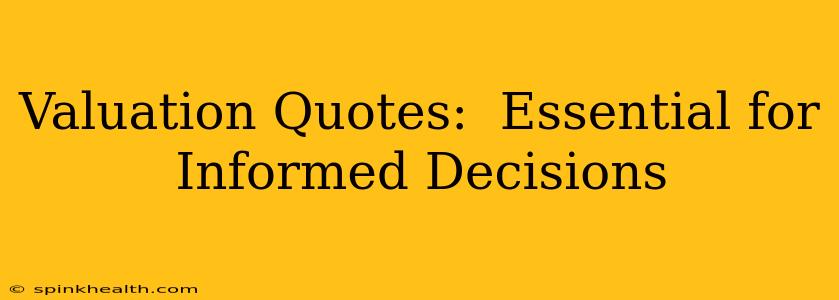Valuation, the process of determining the economic worth of an asset or company, is a cornerstone of sound financial decision-making. Whether you're investing in stocks, buying a property, or running a business, understanding value is paramount. This article explores the importance of valuation quotes and how they contribute to informed choices. We'll delve into different valuation methods, discuss the challenges involved, and answer some frequently asked questions.
What are Valuation Quotes?
Valuation quotes are estimates of an asset's worth, typically provided by professional valuers or generated using sophisticated valuation models. These quotes aren't simply arbitrary numbers; they're derived through a rigorous process that considers various factors relevant to the specific asset being appraised. A strong valuation quote provides a reasoned justification for the price, highlighting the underlying assumptions and methodologies employed. The precision of a valuation quote depends heavily on the data available and the sophistication of the valuation approach.
Why are Valuation Quotes Important?
Accurate valuation quotes are crucial for several reasons:
-
Informed Investment Decisions: Whether you're considering investing in a startup, acquiring a company, or purchasing real estate, a valuation quote helps you determine if the asking price is justified. It prevents overpaying and helps you identify undervalued opportunities.
-
Fair Market Price Determination: In negotiations, a valuation quote provides a solid foundation for establishing a fair market price. It serves as an objective benchmark, reducing the likelihood of disputes or disagreements.
-
Risk Assessment: The valuation process often reveals potential risks associated with an asset. This enables you to make more informed decisions, considering both the upside potential and the downside risks.
-
Financial Planning: Accurate valuations are integral to financial planning, especially for estate planning, taxation, and insurance purposes. They help in determining the net worth and financial standing of individuals and businesses.
-
Due Diligence: In mergers and acquisitions, valuation quotes form a key component of due diligence. They help in verifying the accuracy of financial statements and identifying any discrepancies or hidden liabilities.
Different Valuation Methods
Various methods are employed for valuation, each with its strengths and weaknesses. Common approaches include:
-
Discounted Cash Flow (DCF) Analysis: This method estimates the present value of future cash flows, providing a fundamental measure of intrinsic value.
-
Comparable Company Analysis: This involves comparing the valuation multiples (e.g., Price-to-Earnings ratio) of similar publicly traded companies.
-
Precedent Transactions: This method looks at the prices paid for similar assets in past transactions.
-
Asset-Based Valuation: This approach focuses on the net asset value of the company's assets.
The choice of valuation method depends on several factors, including the nature of the asset, the availability of data, and the purpose of the valuation.
What are the Challenges in Obtaining Accurate Valuation Quotes?
Obtaining accurate valuation quotes can be challenging due to several factors:
-
Data Availability: Accurate valuation relies on reliable and complete data. In some cases, obtaining sufficient data may be difficult or impossible.
-
Subjectivity: Certain valuation methods involve subjective judgments, leading to variations in estimates.
-
Market Volatility: Market conditions can significantly influence valuation, making it challenging to predict future values accurately.
-
Complexity: Valuing complex assets, such as intellectual property or technology companies, can be particularly challenging.
How to Find a Qualified Valuer?
Choosing a qualified valuer is crucial to ensure the accuracy and reliability of your valuation quote. Look for professionals with relevant experience, certifications, and a strong reputation. Consider seeking referrals from trusted sources, and thoroughly review the valuer's qualifications and experience before engaging their services.
What Factors Influence Valuation Quotes?
Numerous factors can influence valuation quotes, including:
-
Market Conditions: Economic conditions, interest rates, and market sentiment all play a role.
-
Industry Trends: Industry-specific trends and growth prospects significantly impact valuations.
-
Financial Performance: A company's financial history and projected future performance are key factors.
-
Management Team: The quality and experience of the management team can influence valuation.
-
Competitive Landscape: The competitive landscape and market share affect a company's value.
What is the Difference Between Market Value and Book Value?
Market value reflects the price an asset would fetch in the open market, while book value represents the net asset value as shown on a company's balance sheet. These values often differ significantly, with market value typically reflecting future growth potential, while book value reflects historical cost.
How Often Should I Get a Valuation Quote?
The frequency of valuation quotes depends on the asset and its purpose. For investments, regular valuations might be beneficial to monitor performance and inform investment decisions. For businesses, regular valuations may be necessary for financial reporting, taxation, or planning purposes.
Conclusion
Valuation quotes are indispensable tools for making informed decisions regarding financial assets. While obtaining accurate and reliable quotes can be challenging, understanding the underlying principles and methodologies involved is crucial for navigating the complex world of valuation. By using appropriate valuation methods and engaging qualified professionals, you can significantly enhance the accuracy and reliability of your valuation estimates.

